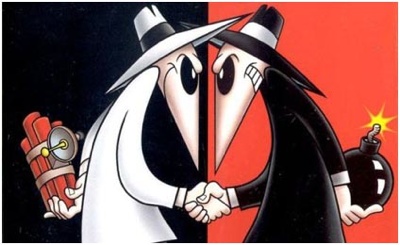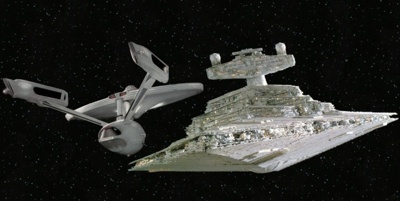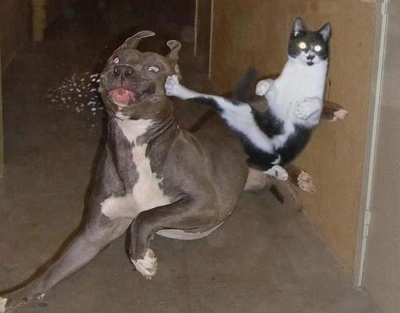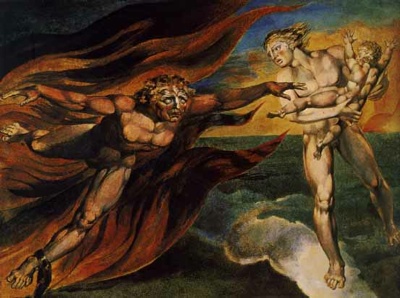 Food
Food  Food
Food  Movies and TV
Movies and TV 10 Shared TV Universes You’ve Likely Forgotten About
 Weird Stuff
Weird Stuff 10 of History’s Greatest Pranks & Hoaxes
 Miscellaneous
Miscellaneous 10 LEGO Facts That Will Toy with Your Mind
 Misconceptions
Misconceptions 10 Widespread Historical Myths and the Texts That Started Them
 Crime
Crime 10 Incredible Big-Time Art Fraudsters
 Movies and TV
Movies and TV 10 Most Influential Fictional Objects in Cinema History
 Our World
Our World Top 10 Real Almost‑Cities That Never Materialized
 Technology
Technology 10 Unsettling Ways Big Brother Is (Likely) Spying on You
 Music
Music 10 Chance Encounters That Formed Legendary Bands
 Food
Food 10 Modern Delicacies That Started as Poverty Rations
 Movies and TV
Movies and TV 10 Shared TV Universes You’ve Likely Forgotten About
 Weird Stuff
Weird Stuff 10 of History’s Greatest Pranks & Hoaxes
Who's Behind Listverse?

Jamie Frater
Head Editor
Jamie founded Listverse due to an insatiable desire to share fascinating, obscure, and bizarre facts. He has been a guest speaker on numerous national radio and television stations and is a five time published author.
More About Us Miscellaneous
Miscellaneous 10 LEGO Facts That Will Toy with Your Mind
 Misconceptions
Misconceptions 10 Widespread Historical Myths and the Texts That Started Them
 Crime
Crime 10 Incredible Big-Time Art Fraudsters
 Movies and TV
Movies and TV 10 Most Influential Fictional Objects in Cinema History
 Our World
Our World Top 10 Real Almost‑Cities That Never Materialized
 Technology
Technology 10 Unsettling Ways Big Brother Is (Likely) Spying on You
 Music
Music 10 Chance Encounters That Formed Legendary Bands
Top 10 Ultimate Rivalries
Conflict and opposition have been a common trait of the human experience throughout history. Some rivalries come and go, but some rivalries have become so inherent to our lives that no one can deny their influence on the modern world. Even if some rivalries seem petty and unimportant, they secretly represent a much deeper conflict that may occur in our world and sometimes within ourselves. This list of the Top 10 ultimate rivalries reminds us of a world in black and white, where conflicts are much simpler and innocent; when in reality we live in a complex and chaotic world, tinted in many shades of gray.
Spy vs. Spy is a silent comic strip created by Antonio Prohias and published in Mad Magazine from 1961 to this day. In the strip, two spies known only as White and Black, are constantly in a battle of deception to steal the other side’s secret plans while at the same time setting up intricate traps to kill each other. Just when it seems that one of them will be falling into a lethal death trap the other one lay out, the trap is ingeniously backfired by the first, and the other spy is comically killed while the first spy escapes with a mischievous smile and doing the v sign with both hands. In a few occasions, a third, female spy known as Lady in Grey is involved, and always ends up besting both Black and White, mostly due to them being helplessly in love with her.
Prohias, whose name appears in every strip in Morse code, and who fled from Cuba just before Castro took over the free press, considered himself a spy of sorts, and drew the cartoon as a satire of the Cold War and a criticism of its pointlessness. By 1990, health complications impeded his work on the strip, and other editors of MAD took over the task. Prohias passed away on February 24, 1998. Spy vs. Spy is possibly the longest running feature in MAD magazine, and the hilarious battles of wit between Black and White are still ongoing in the pages of the satirical magazine.
The two biggest cola brands in the world, Coca-Cola and Pepsi, have almost always been in direct competition, as they have both risen to global fame and have come to be hugely popular in all corners of the world. The immense popularity of both carbonated beverages has led to many a battle for the preference of the public in what has come to be known as the Cola Wars. What began as a struggle to strive in the American soft drink market, within a century became a global battle for cola domination in almost every nation of the world. During most part of the 20th century, both beverages rose to fame almost shoulder to shoulder, with no apparent winner.
But the ‘conflict’ escalated when Pepsi unveiled its “Pepsi Challenge”, where people were given a taste test of two unlabeled cola cans, and most of them turned out to prefer the can containing Pepsi. As a response, Coca Cola concocted a new formula for their beverage and released it as the “New Coke”. This new Coke was quite unpopular among the public, and Coca Cola quickly returned to its old formula, calling it “Coca Cola Classic”. After this, both companies have undertaken fierce advertising campaigns aimed mostly at a teenage audience, trying to one-up their rival in the global cola market through catchy slogans, different flavors and spin-offs, and celebrity spokespersons. Although Coca Cola dominates the market overall, Pepsi still possesses several bastions of popularity around the world, and is hot on the heels of its rival of this 100-year+ conflict.
If you want the ultimate conflict within the almighty geek populace, spanning several decades of shaping and reshaping pop culture as we know it, and bringing war to space and cyberspace alike, yet with no apparent winner to be found, then you need to look no further than the “Star Wars vs. Star Trek” debate. Each of these powerful franchises have defined the genre of Science Fiction across the media industry through TV shows, major feature films, spin-off books, video games, conventions, and toys. As a result, seemingly endless battalions of die-hard fans of each franchise have taken it to themselves to defend their obsessions by lashing out against their sci-fi counterparts at conventions and internet chat rooms.
Although both franchises have several similarities which roughly unite them within the Science Fiction genre, such as laying out an entire galaxy teeming with alien species ready to battle each other in outer space with cool spaceships and other futuristic technologies, they can also be considered completely different and opposing when it comes to thematic undertones and philosophies, among many other things that fans are able to rant incessantly about. No matter how many words are posted in message boards about the subject, no matter how many fanfiction crossover stories may be written; this battle for the supremacy of sci-fi may never see a true resolution.
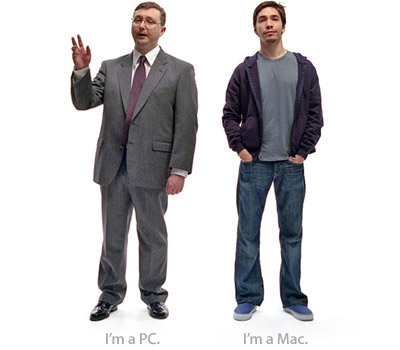
The impact of the advent of computers onto the modern world is undeniable. And on the forefront of this revolution were two particular businesses which started small, but dreamt big, and became the most important computer corporations in the world. By the early 80’s, Apple Computer, founded by Steve Jobs and Steve Wozniak, was already enjoying success from its innovative series of “Apple” computers, while Microsoft, founded by Bill Gates and Paul Allen, was just releasing its first operating system (or OS). But after getting a contract with IBM, Microsoft released its DOS series of operating systems and experienced a rise in the industry as it began to dominate the market through DOS and several software products aimed for businesses. Apple acknowledged the presence of Microsoft, and in 1984 launched a major advertising campaign for its new Macintosh computer. The success of the Macintosh was limited, and Microsoft on the other hand kept on the rise with its several forays into the computing market, and especially its new Windows series. By 1993 Microsoft already dominated the market while the Apple industry started to struggle. During the 90’s Apple was on such a slump that it had to cut deals with both IBM and Microsoft to release joint products in an attempt to recover. Microsoft and its Windows OS series became synonymous with Personal Computers, while Apple became the less popular alternative.
By the turn of the new millennium Apple experienced a revival of its brand through the introduction of the iMac and other products sharing a new, fresh, streamlined style of computers. But it wasn’t until the release of the iPod that Apple was back again on top of the world. The huge success of the iPod popularized the new Apple style, and the iMac computers would rise in popularity as a result. Nowadays, Apple’s ‘fresh’ and ‘young’ style has come to directly antagonize the more ‘traditional’ style of Microsoft, as depicted by the ‘Mac vs. PC’ series of ads. Although Microsoft still dominates the PC industry, Apple has an undeniable influence over modern electronics through the iPod and its more recent iPhone, which have once again made Apple a worthy contender against the Microsoft empire.
Although they are not predator and prey, dogs and cats could nevertheless be considered the most famous “natural enemies” on the planet. Since the dawn of civilization, both canines and felines have held a place of privilege within the cities and homes of mankind; and as such, they have inevitably come to face each other in an ultimate battle for man’s fondness.
This rivalry becomes more intense when we consider that they have seemingly opposing traits (even if this is true mostly as a stereotype): one is sly and cunning, while the other is brawny and brash; one acts like a loner who demands man’s attentions, and the other glows with friendliness towards its master. Whatever your predilection, dogs and cats will continue to resent each other as long as there are human homes to contest and back alleys to claim.
What makes us who we are? Is it a lifetime of nurturing and experiences, or were we predestined by our genes to become who we are today? Is our behavior defined by biological imperatives, or do we have some say in what we eventually become in life? How important are my genes in defining my life as opposed to the way I was raised? All these questions seek to find a solution to the “nature vs. nurture” debate. Some think that genetics and biology are quite irrelevant when it comes to defining your personality, and we are basically a blank slate (“tabula rasa”) ready to be shaped into whatever kind of individual our parents and society wants us to be. Yet others emphasize the importance of heredity and genetics in defining people, since it is through those traits inherited from our parents that we become predisposed to certain behaviors and characteristics. Genes could be the primary trigger which defines our propensity to be intelligent, to be fat, to smoke, to be an athlete, to be bitter, to like rock music or classical music, etc.; in short, since the moment we are born, we would be predestined to be who we are.
But, the environment may also play an important role when it comes to those genes actually ‘expressing’ themselves in our lives; so even if genes have an important role in defining our personality, so would the way we are raised and our experiences in life. Genetics and behavioral sciences have come to make the subject very complex and fill it with even more questions about the nature of humanity.

This evident and very significant rivalry could be presented as stemming from the most basic dichotomy in nature, where the biological need for harmony between the male and the female for the purpose of survival contrasts with the usually radical differences between the genders. It could also be presented as an undeniable element in the history of human life, where women have needed to struggle through the ages against the social and cultural injustices of a seemingly male-dominated culture.
I prefer to present this conflict in terms of how kids have defined their reasons for enmity and bitter war against each other: girls have cooties, and boys are gross. Simple, huh?
The rivalry between the so-called Eastern and Western cultures is a very complex and extensive subject, spanning many centuries of history, and deeply defining human civilization up until modern times. Throughout the ages, this conflict has taken many shades and names, with religious and political struggles occurring. Defining the East and the West in itself is difficult, since it is not at all a purely geographical condition. But there’s no denying that several major wars and events in world history have happened directly from the opposition between the two. Arguably, religion and political ideologies are the two most important traits used to define this opposition, but these characteristics become evident only by observing the societies that have been established within each; or in other words, the way human beings have embraced and expressed their lives as a product of living in those cultures of the world.
This rivalry is quite evident in modern times, where the current major global wars taking place can be considered a struggle between the cultures of the East and the West. But at the same time, thankfully, an important process of global integration and diffusion of information is taking place, through the use of modern communications, as well as an increased interest for foreign cultures all over the world. Hopefully, this process will bring forth a much needed understanding of other cultures which are not our own, and help us appreciate the differences between our cultures; helping us perceive, through those very differences, what we all have in common as human beings.

One of the most relevant conflicts that define the very nature of our humanity is the constant struggle between our reason and our emotions. Many philosophical works have been written through the centuries trying to discern how these two aspects of our mind come into play to define human thinking. Yet, as of today, we still know very little about the way our mind works. If reason is the logical use of our mental faculties, something that is arguably exclusive to humans, then it is thanks to this aspect that we have developed as a superior species and have erected our grand civilization throughout time. But it would be foolish to limit human thinking and acting as only out of rationalization, because emotions constantly play a big part in the way we act. So, if emotion is a more primordial aspect of our minds, then how could we claim to be rational beings? What if you’re driven by your emotions? What if you’re too cold and rational about life? How could we find a true understanding of our minds without falling to the whims of one aspect or the other?
This antagonism is actually deeper than it seems, because it is thanks to this conflict that we have come to wonder about more mystifying aspects of life. What is love? Is it a completely emotional and biological process, or does something else, such as reason, come into play when we decide to be with someone for the rest of our lives? Is religion an emotional urge of some sort, or is it derived from our reasoning of something which may exist beyond us? What are the limits of the power of the mind as it perceives and shapes reality? What is ‘real’? Does the soul exist? What is God? Are we really able to answer these questions when we know so little about how our very minds work? Scientists, philosophers, priests, and even you and I are looking for answers to these questions, and as long as they remain unanswered, our reason and our emotion will keep on struggling in order to find the answers.
The ultimate rivalry is as old as time itself, and has been known by many names throughout the ages: Yin vs. Yang, light vs. darkness, creation vs. destruction, order vs. chaos, God vs. the Devil… Since antiquity, human beings have been involved in this eternal battle. In just about every story ever written you’ll find this struggle between good and evil, whether literally or symbolically. The presence of good and evil in humanity is not at all straightforward, for example: justice, an eye for an eye, conscience and lack thereof, pure evil, survival of the fittest, religion, politics, etc. etc.
Ethics and morality have been used to try to define what is inherently good and evil. Many philosophers have tried to explain the nature of evil and the nature of good. All religions explain the reasons and justifications for good and evil acts in their own way. There are daily acts of goodness as well as daily acts of wickedness throughout the world. Although it seems like the most basic of rivalries, it is, in fact, the most important conflict that humanity has ever seen. Shouldn’t all of us be concerned about knowing if what we are doing is for our own benefit only, or is actually helping others’ lives as well? Shouldn’t we place the welfare of others before our own? Shouldn’t we all make certain that our actions are bringing either good or bad to the world? Despite all the confusion, it should be imperative for everyone to understand whether what they are doing with their lives is selfish and harmful to others, or if what they do every day is making the world a better place for everyone on it.
What side are you on?
Notable omission: Kasparov vs. Deep Blue
